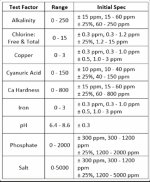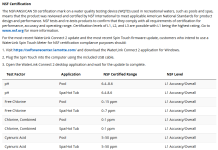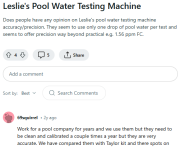Yes, its four years old anyway and rather than try to salvage it with fine grained adjustments of chemistry, this promptly gets me clean water and a known good starting point. I'll need to "initialize" of course, so will get a Leslie test to begin with then start using a test kit as I learn more about the chemistry.Are you planning a complete refill?
Is a pool refill best option in my case?
- Thread starter Sherlock
- Start date
You are using an out of date browser. It may not display this or other websites correctly.
You should upgrade or use an alternative browser.
You should upgrade or use an alternative browser.
- Apr 10, 2018
- 6,334
- Pool Size
- 18375
- Surface
- Plaster
- Chlorine
- Salt Water Generator
- SWG Type
- CircuPool RJ-45 Plus
You'll need to get a TFP recommended test kit. We won't provide advice on Pool Store tests.
I understand the site's position on that. I am an engineer myself (but know little about chemistry) so have a very good understanding of test and measurement, accuracy, sensitivity and repeatability.You'll need to get a TFP recommended test kit. We won't provide advice on Pool Store tests.
Regarding the claims about Leslie's testing - personally I'd much rather see evidence rather than anecdotes here. I'm sure there are justifications for the distrust of pool stores but without definitive data of tests against some reference measurements and some analysis of the data (say a spreadsheet) then it's not easy for me to totally discount the pool stores, I mean I would if there was such evidence taken by some neutral party.
- Apr 10, 2018
- 6,334
- Pool Size
- 18375
- Surface
- Plaster
- Chlorine
- Salt Water Generator
- SWG Type
- CircuPool RJ-45 Plus
Fair enough. You came here for help and you got it from TFP experts and guides. We understand we can't convince everyone to follow TFP protocol, but we know what works and what doesn't.
Best wishes.
Best wishes.
I appreciate people's help, no doubt. I simply pointed out that regarding test methods I'd - personally - prefer it if there was some objective data about all this along with a designated reference to which stuff is compared. This is one of the first things I look at myself when discussing electronics test and measurement, benchmarks, tolerances and so on.Fair enough. You came here for help and you got it from TFP experts and guides. We understand we can't convince everyone to follow TFP protocol, but we know what works and what doesn't.
Best wishes.
It's not really possible to say Test Kit X is "more accurate" than Test Kit W without reliable data, this is perhaps a bit more of a challenge with chemical tests that might rely on color perception and so on, but without some objectivity it's not possible to speak about some test kit being better than some other.
Having said that, everyone working with a designated reference test kit (as TFP do) is helpful providing that test kit is itself consistent and every kit always generates results that are within a defined tolerance.
Last edited:
- Aug 20, 2020
- 7,780
- Pool Size
- 27000
- Surface
- Plaster
- Chlorine
- Salt Water Generator
- SWG Type
- CircuPool RJ-60
Did you read the reply earlier about testing the same water at multiple stores or even same store at different times and noting the sometimes huge differences in results? Theres lots of data cataloged on this site alone, my own experience included.I appreciate people's help, no doubt. I simply pointed out that regarding test methods I'd - personally - prefer it if there was some objective data about all this along with a designated reference to which stuff is compared. This is one of the first things I look at myself when discussing electronics test and measurement, benchmarks, tolerances and so on.
It's not really possible to say Test Kit X is "more accurate" than Test Kit W without reliable data, this is perhaps a bit more of a challenge with chemical tests that might rely on color perception and so on, but without some objectivity it's not possible to speak about some test kit being better than some other.
Having said that, everyone working with a designated reference test kit (as TFP do) is helpful providing that test kit is itself consistent and every kit always generates results that are within a defined tolerance.
I appreciate people's help, no doubt. I simply pointed out that regarding test methods I'd - personally - prefer it if there was some objective data about all this along with a designated reference to which stuff is compared. This is one of the first things I look at myself when discussing electronics test and measurement, benchmarks, tolerances and so on.
It's not really possible to say Test Kit X is "more accurate" than Test Kit W without reliable data, this is perhaps a bit more of a challenge with chemical tests that might rely on color perception and so on, but without some objectivity it's not possible to speak about some test kit being better than some other.
Having said that, everyone working with a designated reference test kit (as TFP do) is helpful providing that test kit is itself consistent and every kit always generates results that are within a defined tolerance.
Your post comes very close to being a lecture to us on testing precision and interpretation.
Since roughly 20 years ago, starting with Ben Powell and PoolForum......TFP pretty much wrote the book on the need for precision and consistency in pool water management.
With hundreds of thousands of pool owners and their "anecdotal" successes.........Thanks, but we really don't need any more help in that area.
I hope Leslie's provides you the information you were unable to find on our forum
- Apr 10, 2018
- 6,334
- Pool Size
- 18375
- Surface
- Plaster
- Chlorine
- Salt Water Generator
- SWG Type
- CircuPool RJ-45 Plus
Despite the proven accuracy and reliability of Taylor-based chemistry test, this is a key point. As an individual tester, using the same test kit/reagents and same testing methods adds to the reliability of results. It allows the user to see incremental changes between the repeated tests. This is most important when testing completing the Overnight Chlorine Loss Test and when determining the amount of chlorine needed to maintain FC above minimum levels. During the SLAM Process, you'll need to test high levels of FC several times a day. Unless the pool store is next door to your house, making those trips several times a day is not practical (and not advisable).Having said that, everyone working with a designated reference test kit (as TFP do) is helpful providing that test kit is itself consistent and every kit always generates results that are within a defined tolerance.
As a group, using the same testing methods maintains consistency in the advice provided. It's puts us all on the same page and we can provide advice with confidence.
- Aug 20, 2020
- 7,780
- Pool Size
- 27000
- Surface
- Plaster
- Chlorine
- Salt Water Generator
- SWG Type
- CircuPool RJ-60
@Sherlock, these folks are trying to help you avoid what so many on this site have experienced.
I think you may have had some bad water test experience. Its not as hard or subjective as it sounds with the kit TFP uses. For reference, heres the Leslies test tolerance specification attached for some data.
Take chlorine as an example: It says it can read a maximum of 15ppm, and at any value over 1.2ppm, the accuracy is +\- 25%. If my FC reads 4ppm, it could actually be 3ppm or 5ppm. Thats a huge difference that grows as chlorine requirements get higher. And thats with a perfectly calibrated machine, operated by a competant employee, and properly cleaned from the previous test.
The accuracy of the Taylor tests are all +\- 1 drop and the chlorine test is accurate to +\- 0.2ppm all the way up to 50ppm. So its quite easy to say that the one test kit is more accurate than Leslies testing.

I think you may have had some bad water test experience. Its not as hard or subjective as it sounds with the kit TFP uses. For reference, heres the Leslies test tolerance specification attached for some data.
Take chlorine as an example: It says it can read a maximum of 15ppm, and at any value over 1.2ppm, the accuracy is +\- 25%. If my FC reads 4ppm, it could actually be 3ppm or 5ppm. Thats a huge difference that grows as chlorine requirements get higher. And thats with a perfectly calibrated machine, operated by a competant employee, and properly cleaned from the previous test.
The accuracy of the Taylor tests are all +\- 1 drop and the chlorine test is accurate to +\- 0.2ppm all the way up to 50ppm. So its quite easy to say that the one test kit is more accurate than Leslies testing.

Last edited:
Yes I did and I'm sure that means something, can be explained somehow. But to say the testing is therefore unreliable is jumping to a conclusion. I've read in several places that using a reagent based test one can get different results depending on how long the sample has been sitting around or one can get different results between multiple samples take from different parts/depths of a pool even at the same time.Did you read the reply earlier about testing the same water at multiple stores or even same store at different times and noting the sometimes huge differences in results? Theres lots of data cataloged on this site alone, my own experience included.
I also just read that some test strips are better than using reagents, the medical industry use to use reagents for testing aspects of human blood but now universally use test strips and that the consistency is very high, the medical industry have very tight tolerances and so on, so any testing technology that has emerged from it must have been pretty heavily developed.
So some of the variations reported cannot hastily be attributed to poor testing technology. Granted in store testing likely does hinge on operator skill, honesty and so on, but why not just use testing strips? Surely TFP can offer reasonable advice with goo quality test strips too?
- Apr 10, 2018
- 6,334
- Pool Size
- 18375
- Surface
- Plaster
- Chlorine
- Salt Water Generator
- SWG Type
- CircuPool RJ-45 Plus
Surely TFP can offer reasonable advice with goo quality test strips too?

Year after year, we always have to remind someone (like Sherlock) that TFP is not an arguing forum........it is a teaching forum.
We have developed a method of pool water care that is close to bullet proof......all without magic bullets that line the Pool Stores shelves.
If your choice is Leslies and "goo strips" (was that a typo?) then run with it but please don't come to our forum and argue it's merits......we've heard it all before and it has little validity.
We have developed a method of pool water care that is close to bullet proof......all without magic bullets that line the Pool Stores shelves.
If your choice is Leslies and "goo strips" (was that a typo?) then run with it but please don't come to our forum and argue it's merits......we've heard it all before and it has little validity.
Homebrewale
Silver Supporter
- Apr 21, 2020
- 1,554
- Pool Size
- 22000
- Surface
- Fiberglass
- Chlorine
- Salt Water Generator
- SWG Type
- Pentair iChlor 30
@Sherlock, these folks are trying to help you avoid what so many on this site have experienced.
I think you may have had some bad water test experience. Its not as hard or subjective as it sounds with the kit TFP uses. For reference, heres the Leslies test tolerance specification attached for some data.
Take chlorine as an example: It says it can read a maximum of 15ppm, and at any value over 1.2ppm, the accuracy is +\- 25%. If my FC reads 4ppm, it could actually be 3ppm or 5ppm. Thats a huge difference that grows as chlorine requirements get higher. And thats with a perfectly calibrated machine, operated by a competant employee, and properly cleaned from the previous test.
The accuracy of the Taylor tests are all +\- 1 drop and the chlorine test is accurate to +\- 0.2ppm all the way up to 50ppm. So its quite easy to say that the one test kit is more accurate than Leslies testing.
View attachment 572629
I've seen this posted several times. Is it linked somewhere on here and easily found? I think it's one of the best arguments in not using Leslie's. If you consider CYA, I'm trying to maintain 70 ppm. Do I really want to accept a +/- accuracy of 25%? Same with alkalinity. I'm trying to maintain 70 ppm there too. Then with salt, if you are trying to maintain 3200 ppm, the +/- 25% accuracy could mean you are near either the upper or lower limits of the SWG. I'll stick with the Taylor tests.
Homebrewale
Silver Supporter
- Apr 21, 2020
- 1,554
- Pool Size
- 22000
- Surface
- Fiberglass
- Chlorine
- Salt Water Generator
- SWG Type
- Pentair iChlor 30
I think such sensitivity is unwarranted, there's nothing wrong with questioning someone's claims and if you want to call that "arguing" that's your choice. I am simply pointing out that the claims about testing accuracy and reliability need supporting evidence, that's all and anyone who finds this unacceptable only raises suspicion because if we're discussing science then everything can be settled by facts not anecdotal opinions.Year after year, we always have to remind someone (like Sherlock) that TFP is not an arguing forum........it is a teaching forum.
We have developed a method of pool water care that is close to bullet proof......all without magic bullets that line the Pool Stores shelves.
If your choice is Leslies and "goo strips" (was that a typo?) then run with it but please don't come to our forum and argue it's merits......we've heard it all before and it has little validity.
Here's an example water test device, I have no idea what Leslie's use, but you can see fort yourself the device meets a recognized certification standard NSF Level 1:

Now what is the NSF Level for the kits you have decided to standardize on at TFP?
- Aug 20, 2020
- 7,780
- Pool Size
- 27000
- Surface
- Plaster
- Chlorine
- Salt Water Generator
- SWG Type
- CircuPool RJ-60
I had to dig a bit to find it.I've seen this posted several times. Is it linked somewhere on here and easily found? I think it's one of the best arguments in not using Leslie's. If you consider CYA, I'm trying to maintain 70 ppm. Do I really want to accept a +/- accuracy of 25%? Same with alkalinity. I'm trying to maintain 70 ppm there too. Then with salt, if you are trying to maintain 3200 ppm, the +/- 25% accuracy could mean you are near either the upper or lower limits of the SWG. I'll stick with the Taylor tests.
What you guys might want to consider, is investing in one of these devices and use that as your standard. I don't mean we should all buy one, I mean you could rate the test methods and kits to recommend by how they compare with the L1 Standard device, this could be your calibration source, every kit you suggest could be evaluated against this device one that meets a worldwide recognized standard.
That's all I'll say, I am not looking to fight or argue.
That's all I'll say, I am not looking to fight or argue.
- Aug 20, 2020
- 7,780
- Pool Size
- 27000
- Surface
- Plaster
- Chlorine
- Salt Water Generator
- SWG Type
- CircuPool RJ-60
You’re welcome to try the test strips and see how it goes.So some of the variations reported cannot hastily be attributed to poor testing technology. Granted in store testing likely does hinge on operator skill, honesty and so on, but why not just use testing strips? Surely TFP can offer reasonable advice with goo quality test strips too?
- Aug 20, 2020
- 7,780
- Pool Size
- 27000
- Surface
- Plaster
- Chlorine
- Salt Water Generator
- SWG Type
- CircuPool RJ-60
No worries, that device is well known and doesnt have the test range needed, according to the specifications they list. You can also do a search for spectrometer based testing and some of the issues with it.What you guys might want to consider, is investing in one of these devices and use that as your standard. I don't mean we should all buy one, I mean you could rate the test methods and kits to recommend by how they compare with the L1 Standard device, this could be your calibration source, every kit you suggest could be evaluated against this device one that meets a worldwide recognized standard.
That's all I'll say, I am not looking to fight or argue.
Thread Status
Hello , This thread has been inactive for over 60 days. New postings here are unlikely to be seen or responded to by other members. For better visibility, consider Starting A New Thread.


